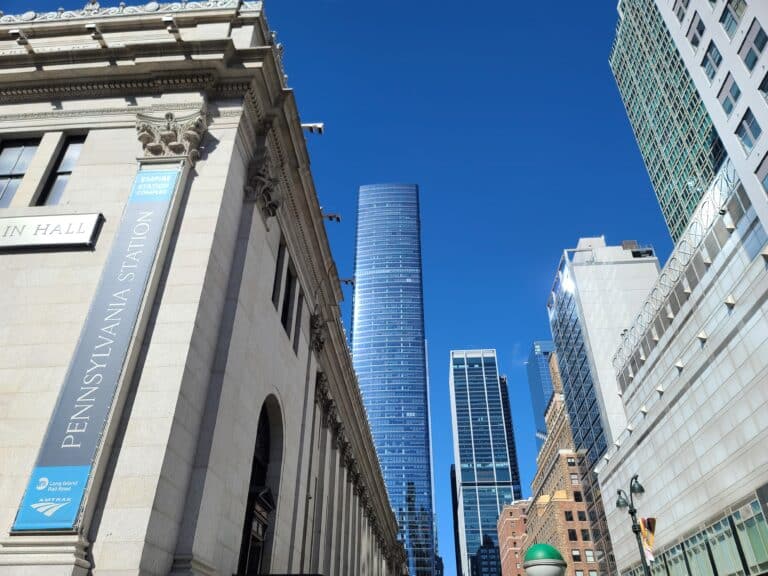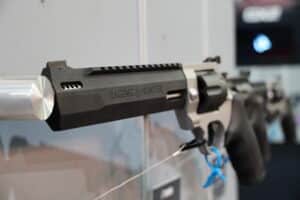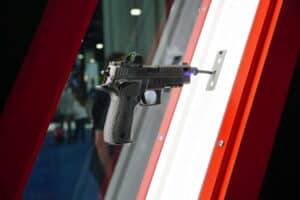Lawmakers and law enforcement officials in New York continue to push the Second Amendment’s limits as outlined just last year in a case they lost at the Supreme Court.
This week, we found out the NYPD’s reaction to SCOTUS striking down the state’s restrictive concealed carry permitting regime for being too selective was to issue fewer permits and at an even lower approval rate than before. In 2021, a new report from a local publication called The City shows, officials approved 2,591 of 4,663 gun ownership or carry permit applications–or 56 percent. In 2022, that number fell to 1,550, or 21 percent, of the 7,260 applications it received.
The numbers from the six months after the Supreme Court’s ruling in New York State Rifle and Pistol Association v. Bruen were even worse than the overall average for 2022. Applications for that period more than doubled from just over 2,000 to just under 5,000 as demand for gun permits rose in the wake of the ruling. However, the city only approved 503, or just over 10 percent, of those applications. And the change is unlikely to be caused by a surge in people applying who don’t qualify for a permit because the NYPD has only denied 16 of those applicants. They are simply sitting on the rest of them.
This is not a positive development for New Yorkers who wish to legally arm themselves. But it’s also bad news for the NYPD’s permitting division, which is likely susceptible to a civil-rights challenge, and the state’s new restrictive concealed carry law, which has already garnered skepticism from key members of the High Court as a potential attempt to disregard Bruen.
This is especially true if the NYPD is intentionally slow-walking the gun permits. That’s what attorney Peter Tilem, who is representing gun owners in a class-action lawsuit related to the delays, said is probably going on.
“‘Holy shoot, what do we do now?'” he told The City, imagining discussions between NYPD officials. “Let’s not decide anything and let’s figure out what our options are.'”
After all, it did take the city a few weeks just to come up with a replacement for the law SCOTUS struck down. And the law has been enjoined several times since it was enacted in the fall of 2022. So, there were significant periods of time when the strictest parts of the state’s permitting process weren’t applicable, and the NYPD should have been issuing permits.
But they weren’t.
That’s a bad look for the department and the state alike. After all, New York is already facing down several, to-this-point-successful, challenges to its Bruen-response law. The state has done very little to disguise its end goal.
When asked by reporters where permit holders would be able to legally carry under the state’s broad expansion of gun-free “sensitive places,” Governor Kathy Hochul (D.) responded, “Probably some streets.”
That’s despite the Supreme Court explicitly noting in Bruen that, while some places can be kept off-limits for gun carry, they are limited.
“Put simply, there is no historical basis for New York to effectively declare the island of Manhattan a ‘sensitive place’ simply because it is crowded and protected generally by the New York City Police Department,” the majority wrote.
The NYPD seems to be doing just as little to disguise its attempt to avoid issuing gun permits to law-abiding residents. And that’s despite a warning from Justices Bret Kavanaugh and John Roberts that, while objective permitting requirements are likely constitutional, any requirements designed to prevent responsible citizens from obtaining permits are not allowed.
“As petitioners acknowledge, shall-issue licensing regimes are constitutionally permissible, subject of course to an as-applied challenge if a shall-issue licensing regime does not operate in that manner in practice,” Kavanaugh wrote.
The lack of permits in the state’s largest city will probably lend credence to the challenges already lodged against the state’s law. And those challenges were going very well even before this new information came out. Federal district judge Glenn Suddaby issued a temporary restraining order against most of the law’s controversial provisions back in October.
“Simply stated, instead of moving toward becoming a shall-issue jurisdiction, New York State has further entrenched itself as a shall-not-issue jurisdiction,” Suddaby wrote. “And, by doing so, it has further reduced a first-class constitutional right to bear arms in public for self-defense (which, during the 19th and 18th centuries in America, generally came with an assumption that law-abiding responsible citizens were not a danger to themselves or others unless there was specific ground for a contrary finding) into a mere request (which is burdened with a presumption of dangerousness and the need to show ‘good moral character’).”
Several other judges have done the same for individual aspects of it too. The state has appealed to the Second Circuit, which has stayed the lower court’s rulings. Its law remains in effect for now, even after a plea to the Supreme Court for intervention was denied in January.
But that doesn’t mean things will stay that way for long. The case has been put on an accelerated schedule. And Justice Samuel Alito, joined by Justice Clarence Thomas, went out of his way to note that the Supreme Court declined to intervene out of respect for the Second Circuit’s process and not because it agreed with New York on the case’s merits.
“The New York law at issue in this application presents novel and serious questions under both the First and the Second Amendments,” Alito wrote in Antonyuk v. Nigrelli. “The District Court found, in a thorough opinion, that the applicants were likely to succeed on a number of their claims, and it issued a preliminary injunction as to twelve provisions of the challenged law.”
They even encouraged plaintiffs in the case to come back to them if the Second Circuit took too long with its decision.
“Applicants should not be deterred by today’s order from again seeking relief if the Second Circuit does not, within a reasonable time, provide an explanation for its stay order or expedite consideration of the appeal,” Alito wrote.
Now, again, New York officials have given the Court another potential reason to get involved sooner than later. It has only been a year since SCOTUS knocked down New York’s strict gun laws. But the state’s officials have put themselves on the fast track for a second showdown with little reason to think the outcome would be any different this time around.







9 Responses
Many decades ago, I worked for a very large heating contractor in NYC. This was at the time when the law against cold-water flats began to be enforced, one of my jobs was to inspect the job and collect the money for the installation. The money usually came out of a hiding place or under a mattress. This was generally given to me in a paper bag. Many times, I had to collect from two or three jobs (which was quite a bit of money). I applied for a carry permit from NYC and was denied because my need did not justify a firearm. Nothing has changed in NYC since then. Thank God I no longer live there.
Yea, I’ve heard many stories along those lines. I’m not surprised the NYPD is trying to keep people from getting permits. I am surprised at how clunky and disastrous from a legal strategy standpoint they’ve been about doing it. After DC lost its gun-carry permitting case, it made a strategic decision not to appeal because it didn’t want to set a new pro-gun precedent at SCOTUS. New York seems to have no qualms about doing just that.
Being someone who grew up in corn country, I never knew what a cold-water flat was until reading your post. Thanks for the edification!
It’s amazing to me how many gun-grabbing states continue to push laws directly in contradiction to Bruen, without seeing the ultimate consequences, as D.C. did after Heller.
How ironic that states who scream “Guns are dangerous!” keep shooting themselves in the foot. 😉
Indeed.
What they just don’t seem to realize is that if this obstinance continues, this is how you get court-mandated constitutional carry nationwide.
Yea, that’s a possibility if they continue to play these sorts of games with shall issue regardless of how the Court reacts.
Stephen – I am wondering, other than what has been pointed out in other comments about court mandated constitutional carry, what is the downside for New York? Is it possible they could be fined, or someone might go to jail? How does the Supreme Court with an anti-gun administration in place and potentially for another four years get the enforcement necessary to make New York comply? In the 1950s after brown versus Board of Education Eisenhower sent troops into Little Rock to enforce the courts ruling. I doubt that the Biden administration would send troops to New York to force them to issue permits.
That’s a good question. The Court can’t necessarily throw New York officials in jail or fine them personally or anything like that. Instead, the threat of a new pro-gun precedent that applies nationwide is usually enough to prevent this sort of backlash.
But, if that isn’t persuasive for state or local officials, the Court can also continue releasing people who were prosecuted under the unconstitutional laws and make the state pay their legal fees. That’s another impediment to continued defiance of the Court. It’s why you don’t usually see states push the limits in the same exact way over and over again. They usually opt for some new approach they think goes up to the line but doesn’t cross it.
That’s technically what you’re seeing with most of these Bruen response laws. They aren’t just saying their old laws are still valid. They’re arguing these new laws are different enough to be constitutional. The problem they face is that the new laws seem plainly at odds with what the Court has already held even if the specific provisions haven’t yet been judged by SCOTUS.